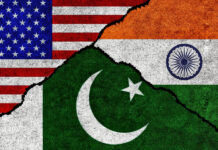As tension mounts with China, it’s high time India develops closer economic and cultural ties with Taiwan. It must shed its diffidence and engage more
Taiwan has been at the centre of a global supply chain in recent months not only for its effective response in handling the Coronavirus pandemic but also for providing medical aid to other countries and helping them fight the virus. Simultaneously, there has been increased military and defence engagement between Taipei and Washington, DC, even as China is increasingly heaving down on the former.
Taiwan has also gained unprecedented attention in India’s foreign policy discourse during the pandemic period. Several experts have advocated enhanced bilateral ties as part of India’s comprehensive strategy to deal with China, following the recent military clash between the two countries in eastern Ladakh. Even two BJP MPs — Meenakshi Lekhi and Rahul Kaswan — attended Taiwanese President Tsai Ing-wen’s swearing-in ceremony through video conference in May, indicating a change in the Modi Government’s approach.
However, the idea of expanding bilateral relations with Taiwan is not new. In fact, domestic, regional and global factors had led the Narasimha Rao Government to establish an “unofficial relationship” in the 1990s, with the establishment of the India-Taipei Association (ITA). Ever since, the relationship between the two nations has seen very limited cooperation. But recent developments have underscored the need for India and Taiwan to transform their “unofficial engagement” into a comprehensive partnership.
In doing so, it is imperative for New Delhi and Taipei to identify their shared strategic, economic, regional and other interests as also common means to achieve their goals. One such shared interest is, of course, to deal with China’s assertive posturing effectively. The recent border standoff between the Indian and Chinese armies in eastern Ladakh once again underscored the fact that deception and denial have been the hallmark of China’s India policy. Thus, as India continues to explore diplomatic, political and other channels to restore status quo ante along the border, New Delhi must also weigh in other options to fight back the Chinese threat.
While the China factor is responsible for the transformed relations between India and the US, improved ties with Taiwan can be equally beneficial for us. This can be gauged from the fact that Taiwan also faces an existential threat from the Chinese. More so, it has a better understanding of China’s strategic depth because of its proximity to it. Both nations also share linguistic and cultural ties. Indeed, Taipei can help New Delhi comprehend China’s strategic thinking in a better way. But for this to happen, India needs to foster military and security engagement at the Government level and increase interaction between think-tanks on both sides.
With Taiwan and India being the two strong pillars of the Trump administration’s Indo-Pacific strategy, India can take a step ahead to include Taiwan in the Quadrilateral Security Dialogue, which now consists of the US, Japan, India and Australia. This move will help India strengthen its counter-Chinese strategy and at the same time boost Taiwan’s independent identity. It will also help it ensure the freedom of navigation in the South China Sea through which 50 per cent of India’s trade takes place. At the same time, India also has an interest in ensuring the uninterrupted exploration of oil and gas in the said region.
Ties with Taiwan should not be solely viewed through China’s lens. Sure, the economic relationship has been the lynchpin of the unofficial relationship between India and Taiwan, with the volume of bilateral trade having reached to $7.5 billion in 2019. In fact, several initiatives have been taken to institutionalise the economic relationship between the two sides. In 2014, the India Electronics and Semiconductor Association and the Taipei Computer Association signed a memorandum to promote local manufacturing in the field of semiconductors and electronics. In August 2015, Hon Hai Precision Industry Co, also known as Foxconn, one of the largest hardware manufacturers in the world, announced an investment of $5 billion in India.
The first Taiwan Expo was held at Pragati Maidan, New Delhi, from May 17 to May 19. The Institute for Information Industry has joined India’s Center of Excellence in Wireless and Information Technology to develop 4G broadband wireless technologies and other products. Over the past 10 years, Acer, D-Link Corp and Transcend have invested about $1 billion in India and China Synthetic Rubber has expressed its desire to invest about $330 million in the State of Andhra Pradesh. Further, China Steel has also proposed to make a $180 million investment in India. CPC Corp, Taiwan, has proposed a $6 billion investment in India, which would surely boost the Make in India programme in the petrochemical industry.
Despite these investments, it is true that the two sides are still far off from realising the full potential of economic cooperation. It will be in India’s interest to expand economic and socio-cultural ties. Given its expertise in the fields of hardware manufacturing, construction, infrastructure, mine exploration, electronic manufacturing, logistics, automobiles, food processing and others, such avenues must be utilised optimally. Taiwan can play a vital role in the success of the Modi Government’s Make in India, Digital India and Skill India initiatives. It is also a hub of high-tech manufacturing.
Similarly, India, too, should explore the possibility of cooperation in the fields of artificial intelligence and medical equipment. In fact, Taiwan has received global appreciation for successfully controlling the pandemic.
New Delhi and Taipei need to institutionalise their cooperation in the technology sector so as to achieve their shared interests. At the same time, by providing a big market, India can significantly reduce the deepening economic ties between China and Taiwan, a stated goal of the Tsai administration as part of her New Southbound Policy. Meanwhile, with the use of Taiwan’s agro-technology, India could transform its agriculture sector as well. Since the Modi Government has attached huge importance to soft diplomacy as part of India’s foreign policy to achieve its national interests, promoting tourism with Taiwan could also be an attractive way of cementing ties between the two nations, given that Buddhism is the religion of the majority of Taiwanese and India is its homeland.
As the Indian Government has decided to review local chapters of Confucius institutes in India, agreements between Indian and Chinese institutes as also several MoUs regarding the Chinese language programme, New Delhi can strengthen ties with Taiwan to run the Chinese language programme in the country. But these efforts would be more effective in cementing ties between the two sides only when the Indian leadership decides to institutionalise the relationship in an effective form. In this regard, India can take a cue from the US’ adherence to improving ties with Taiwan, despite accepting the “One China Policy.” It remains to be seen if India and Taiwan succeed in transforming their bilateral cooperation or the relationship continues to be hostage to the shadow of the Dragon.




























